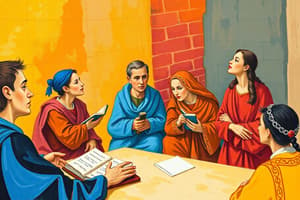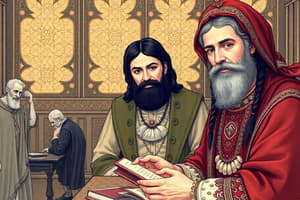Podcast
Questions and Answers
Which virtue emphasizes the importance of making wise decisions for the benefit of students?
Which virtue emphasizes the importance of making wise decisions for the benefit of students?
- Prudence (correct)
- Charity
- Hope
- Fortitude
What was one significant contribution of Horace Mann during the Common School Era?
What was one significant contribution of Horace Mann during the Common School Era?
- Leading the movement for vocational training
- Establishing a system for women’s education
- Promoting Catholic parochial schools
- Advocating for publicly funded education (correct)
Which virtue is associated with recognizing one's limitations and valuing the dignity of others?
Which virtue is associated with recognizing one's limitations and valuing the dignity of others?
- Humility (correct)
- Zeal
- Temperance
- Faith
How did Catholics respond to the Protestant-dominated curriculum in public schools during the Common School Era?
How did Catholics respond to the Protestant-dominated curriculum in public schools during the Common School Era?
What is the definition of a vocation in the context of education?
What is the definition of a vocation in the context of education?
Which educational approach is John Dewey best known for promoting?
Which educational approach is John Dewey best known for promoting?
What did Catherine Beecher advocate regarding women's roles in education?
What did Catherine Beecher advocate regarding women's roles in education?
Which virtue represents passionate dedication to student growth and learning?
Which virtue represents passionate dedication to student growth and learning?
What was the main focus of the New York African Free Schools established in the early 19th century?
What was the main focus of the New York African Free Schools established in the early 19th century?
What was the purpose of the Americanization movement in the late 19th and early 20th centuries?
What was the purpose of the Americanization movement in the late 19th and early 20th centuries?
Which test sparked debates about cultural bias and equity in the education system?
Which test sparked debates about cultural bias and equity in the education system?
What was the focus of public education during World War II?
What was the focus of public education during World War II?
What significant change did the Civil Rights Act of 1964 bring to public education?
What significant change did the Civil Rights Act of 1964 bring to public education?
What was a key outcome of the Little Rock Nine's integration into Little Rock Central High School in 1957?
What was a key outcome of the Little Rock Nine's integration into Little Rock Central High School in 1957?
What was a primary goal of the Elementary and Secondary Education Act (ESEA) of 1965?
What was a primary goal of the Elementary and Secondary Education Act (ESEA) of 1965?
What educational philosophy emphasizes observable behavior and reinforcement?
What educational philosophy emphasizes observable behavior and reinforcement?
The National Defense Education Act of 1958 was influenced by which major event?
The National Defense Education Act of 1958 was influenced by which major event?
Which educational approach is characterized by inquiry-based learning and focuses on student interests?
Which educational approach is characterized by inquiry-based learning and focuses on student interests?
What was a primary feature of the Common School Era in the mid-19th century?
What was a primary feature of the Common School Era in the mid-19th century?
What conflict arose between Catholics and Protestants during the Common School Era?
What conflict arose between Catholics and Protestants during the Common School Era?
Which of the following best describes Thomas Jefferson's view on education?
Which of the following best describes Thomas Jefferson's view on education?
What role did Catherine Beecher promote for women in education?
What role did Catherine Beecher promote for women in education?
John Dewey is known for which educational philosophy?
John Dewey is known for which educational philosophy?
What was a significant characteristic of the Gary Schools established by Superintendent William Wirt?
What was a significant characteristic of the Gary Schools established by Superintendent William Wirt?
Which virtue emphasizes the importance of equity and fairness in education?
Which virtue emphasizes the importance of equity and fairness in education?
How is a vocation defined in the context of education?
How is a vocation defined in the context of education?
Which virtue illustrates the concept of passionate dedication to student learning?
Which virtue illustrates the concept of passionate dedication to student learning?
What was a notable issue faced by public schools during the establishment of Catholic parochial schools?
What was a notable issue faced by public schools during the establishment of Catholic parochial schools?
What was a significant aim of the School Choice Movement?
What was a significant aim of the School Choice Movement?
How did the impact of the Cold War shape public education in the U.S.?
How did the impact of the Cold War shape public education in the U.S.?
What was the goal of the A Nation at Risk report published in 1983?
What was the goal of the A Nation at Risk report published in 1983?
Which educational philosophy emphasizes core knowledge and skills?
Which educational philosophy emphasizes core knowledge and skills?
What was a primary consequence of the Brown vs. Board of Education ruling?
What was a primary consequence of the Brown vs. Board of Education ruling?
Which Act aimed to provide federal funding to close achievement gaps in education?
Which Act aimed to provide federal funding to close achievement gaps in education?
What focus characterized the educational reforms during World War I?
What focus characterized the educational reforms during World War I?
Title IX was enacted to prohibit discrimination based on what characteristic?
Title IX was enacted to prohibit discrimination based on what characteristic?
What did the Stanford-Binet Test spark debates about in education?
What did the Stanford-Binet Test spark debates about in education?
What teaching approach is characterized by rote memorization and standardized testing?
What teaching approach is characterized by rote memorization and standardized testing?
Flashcards
Vocation
Vocation
A calling from God to serve others in a specific way, often involving personal sacrifice and dedication. For educators, this means seeing teaching as a moral and spiritual commitment to shaping students.
Common School Era
Common School Era
A period during the mid-19th century that emphasized universal, free, and non-sectarian education for all children, regardless of their social class.
Faith (Virtue of Christian Educators)
Faith (Virtue of Christian Educators)
Deep trust in God and belief in the Christian mission of education.
Justice (Virtue of Christian Educators)
Justice (Virtue of Christian Educators)
Signup and view all the flashcards
Jefferson's Public Education Vision
Jefferson's Public Education Vision
Signup and view all the flashcards
Catherine Beecher's Role
Catherine Beecher's Role
Signup and view all the flashcards
John Dewey's Contribution
John Dewey's Contribution
Signup and view all the flashcards
The Gary Schools
The Gary Schools
Signup and view all the flashcards
New York African Free Schools
New York African Free Schools
Signup and view all the flashcards
Americanization Movement
Americanization Movement
Signup and view all the flashcards
Stanford-Binet Test
Stanford-Binet Test
Signup and view all the flashcards
Brown v. Board of Education
Brown v. Board of Education
Signup and view all the flashcards
Elementary and Secondary Education Act (ESEA)
Elementary and Secondary Education Act (ESEA)
Signup and view all the flashcards
Title IX
Title IX
Signup and view all the flashcards
Six Learning Philosophies
Six Learning Philosophies
Signup and view all the flashcards
Constructivism
Constructivism
Signup and view all the flashcards
Work-Study-Play Model
Work-Study-Play Model
Signup and view all the flashcards
A Nation at Risk Report
A Nation at Risk Report
Signup and view all the flashcards
What is a vocation?
What is a vocation?
Signup and view all the flashcards
What is the Common School Era?
What is the Common School Era?
Signup and view all the flashcards
Who is Thomas Jefferson?
Who is Thomas Jefferson?
Signup and view all the flashcards
Who is Catherine Beecher?
Who is Catherine Beecher?
Signup and view all the flashcards
Who is John Dewey?
Who is John Dewey?
Signup and view all the flashcards
What are The Gary Schools?
What are The Gary Schools?
Signup and view all the flashcards
Why were Catholic Parochial Schools established?
Why were Catholic Parochial Schools established?
Signup and view all the flashcards
What is the virtue of Faith in Christian education?
What is the virtue of Faith in Christian education?
Signup and view all the flashcards
What is the virtue of Prudence in Christian education?
What is the virtue of Prudence in Christian education?
Signup and view all the flashcards
What is the virtue of Justice in Christian education?
What is the virtue of Justice in Christian education?
Signup and view all the flashcards
School Choice Movement
School Choice Movement
Signup and view all the flashcards
Common Core State Standards
Common Core State Standards
Signup and view all the flashcards
Perennialism
Perennialism
Signup and view all the flashcards
Study Notes
Christian Educator Virtues
- Nine virtues guide Christian educators: Faith, Hope, Charity, Prudence, Justice, Fortitude, Temperance, Humility, and Zeal.
- Faith involves deep trust in God and the Christian mission of education.
- Hope encourages student aspiration for growth, both personal and spiritual.
- Charity involves loving and caring for all students, regardless of background.
- Prudence guides wise decisions for student benefit.
- Justice ensures equitable treatment and fosters fairness among students.
- Fortitude encompasses courage and perseverance in challenging circumstances.
- Temperance promotes self-control and balance in educational practice.
- Humility acknowledges personal limitations and respects student dignity.
- Zeal expresses passionate dedication to fostering student growth and learning.
Vocation Definition
- A vocation is a divinely appointed calling to serve others, involving personal sacrifice and dedication.
- For educators, it's a moral commitment to shaping student minds and hearts.
Common School Era
- The mid-19th century saw the rise of universal, free, and non-sectarian education in the US.
- Reformers like Horace Mann pushed for public funding for schools for all children, including those of all social backgrounds.
Catholics vs. Protestants (Common School Era)
- Curriculum conflicts arose between Catholics and Protestants in public schools.
- Protestant-dominated curricula included mandatory Bible readings and prayers, sparking Catholic opposition.
- Catholics sought separate schools to preserve their faith and teachings.
Thomas Jefferson
- He believed in public education as critical for a democratic society.
- He proposed public elementary schools for all children to receive fundamental education.
Catherine Beecher
- Beecher promoted women's education and teacher training.
- She saw teaching as a moral vocation for women, emphasizing nurturing and education.
John Dewey
- Dewey is considered the father of progressive education.
- He championed experiential learning, critical thinking, and learner-centered teaching.
Gary Schools
- Implemented a "work-study-play" model, integrating academic, vocational, and recreational activities.
- Led by Superintendent William Wirt, this model was implemented in Gary, Indiana.
New York African Free Schools
- Founded in the 19th century to educate free Black children.
- Prioritized academic rigor and moral development, aiming to prepare students for leadership.
Immigration's Impact on Public Education
- Immigration waves in the late 19th and early 20th centuries created challenges for assimilation.
- "Americanization" movements focused on English instruction and American values.
Stanford-Binet Test
- A cognitive ability test used to assess students, which generated discussion about cultural biases and equity.
World War I & II's Impact
- WWI: Schools focused on patriotism and citizenship, introducing military training.
- WWII: Increased focus on science and technology education for war effort support. Federal funding increased.
Cold War's Impact
- The space race and Soviet competition led to a significant increase in STEM education.
- The National Defense Education Act (1958) was created to boost math and science programs.
Elementary and Secondary Education Act (ESEA)
- Was part of Lyndon B. Johnson's War on Poverty, passed in 1965.
- Aimed to reduce achievement gaps by providing federal funding for schools in low-income areas.
Civil Rights Act of 1964
- Prohibited segregation and discrimination in schools, federally funded programs, & education.
- Guaranteed equal educational opportunities for all, regardless of race or ethnicity.
Title IX
- Passed in 1972.
- Banned discrimination on basis of sex in educational programs and opportunities.
Little Rock Nine
- Nine Black students who integrated Little Rock Central High School in 1957.
- Their struggle for desegregation was significant.
Brown vs. Board of Education
- (1954): The Supreme Court ruled against racial segregation in public schools.
- Overturned the "separate but equal" doctrine.
A Nation at Risk Report
- (1983): Highlighting the decline in American educational standards.
- Called for reform to improve academic performance and global competitiveness.
School Choice Movement
- Supports parental choice of school environments (public, private, charter, or voucher schools).
- Aims for better educational quality through competition and individual learning.
Common Core State Standards
- Standardized academic expectations across states.
- Emphasizes critical thinking and analytical skills in math and English language arts.
Six Learning Philosophies
- Perennialism: Focuses on enduring ideas and universal truths.
- Essentialism: Highlights core knowledge and skills.
- Progressivism: Supports experiential, learner-focused education.
- Reconstructionism: Seeks to resolve social issues through education.
- Constructivism: Emphasizes knowledge construction by active learning.
- Behaviorism: Focuses on observable behavior and reinforcement.
Progressive vs. Traditionalist Approaches
- Progressive: Inquiry-based learning, student-centered, creativity focus.
- Traditional: Teacher-led instruction, standardized testing, rote memorization.
- Differing emphases in Math, Science, ELA, and Social studies.
Constructivism
- A learning theory emphasizing active knowledge construction.
- Teachers guide learning through meaningful problems and explorations, focusing on fostering critical thinking and collaboration.
Studying That Suits You
Use AI to generate personalized quizzes and flashcards to suit your learning preferences.



